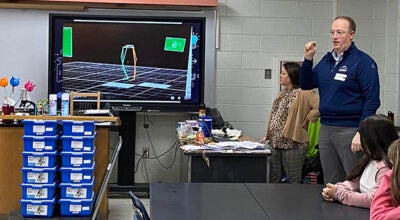Public hearing set for solar project
Published 6:31 am Friday, October 2, 2020
|
Getting your Trinity Audio player ready...
|
The Charlotte County Planning Commission voted to hold a public hearing for a conditional use permit for a proposed 167-megawatt photovoltaic solar energy facility known as Courthouse Solar during its Tuesday, Sept. 22 meeting.
The public hearing is scheduled for Oct. 27 at 7 p.m.
According to the application summary, NOVI Energy proposes to construct a solar facility on 1,354 acres from 12 parcels owned by Blue Rock Resources, LLC, Ridgeway Farm LLC, and Robert and Claire Locke.
The project is southwest of Charlotte Court House and generally bound to the north by George Washington Highway (Rt. 40), to the west by Tollhouse Highway (Rt. 47), to the east by Eureka School Road, and to the south by Ash Camp Creek. The applicant proposes using multiple gated entrances off public roads (Shady Oaks Road, Ingleside Lane, and Eureka School Road).
Energy generating equipment will be located on approximately 1,000 acres.
According to the application, the project infrastructure will consist primarily of approximately 500,000 solar photovoltaic modules mounted on steel racking structures with single-axis tracking, 58 inverters and transformers, a substation with transformers, switchgear, and dead-end structures, and a control building.
During the meeting, several citizens expressed both approval and objection to the solar facility while some asked the commission not to rush the application before more research could be done, and citizens had a chance to voice their opinions.
In a letter to the commission, Claire Locke stated the need for the county to not give up on growth opportunities and a generation of revenue and how county officials can dictate what landowners can do or not do with their own property.
“I am under the assumption that someone who purchases land with their own money has the ability to do what they desire within reasonable conditions specified from the federal and state agencies,” Locke said. “If you do not vote to approve this farm, we will be in the same shape we have been in for my entire life… broke and barely scraping by. In contrast, your approval of this will greatly improve the quality of life for residents of the county with minimal negative impacts.
“The need for continued increases in taxes is eventually going to make Charlotte County an undesirable place to live simply because landowners cannot afford the taxes. For most of my life, the high-quality education that Charlotte County offers has been the one drawing card that the county has had to attract residents. Higher taxes is going to be a deterrent despite the efforts of our school system.”
There is no better way to leave a legacy for our children than to reduce the carbon footprint on Earth. Other countries are far ahead of our efforts in America. The good news is, though, it is not too late for rural, little Charlotte County to join in the effort to provide clean energy by approving this project.”
John H. Mullin, III owner of Ridgeway Farms, one of the three property owners involved in the proposed Courthouse Solar Project also sent a letter that was read during the planning commissions meeting.
Mullin told the commission that the project would result in substantially increased economic benefits for the county and its citizens in the form of increased local employment, particularly during the construction phase, as well as materially enhanced annual revenue for the county during the entire life of the project.
Edward Early, who had expressed his concerns about the project during the commission’s August meeting, again told members not to rush the process.
“One immediate concern is that Charlotte County may need some solar projects, but the placement of them should be carefully planned and not rushed, and citizen input is important,” Early said.
Members of the Eagle Eye Hunt Club also presented a letter requesting that the project’s approval not be rushed saying a solar farm would harm their hunt club property and ability to hunt, as well as harm animals, plants, and streams in the area.




